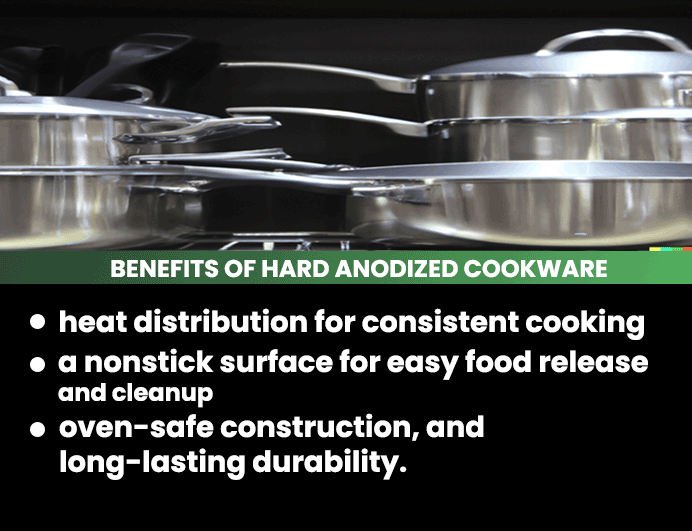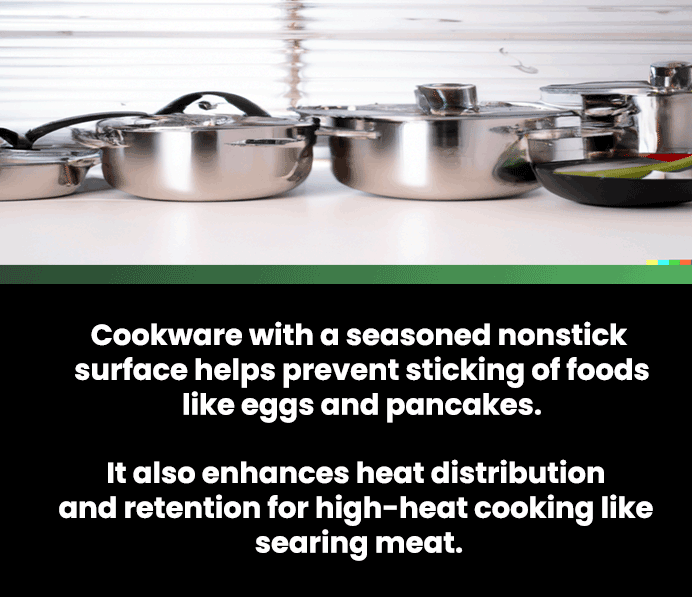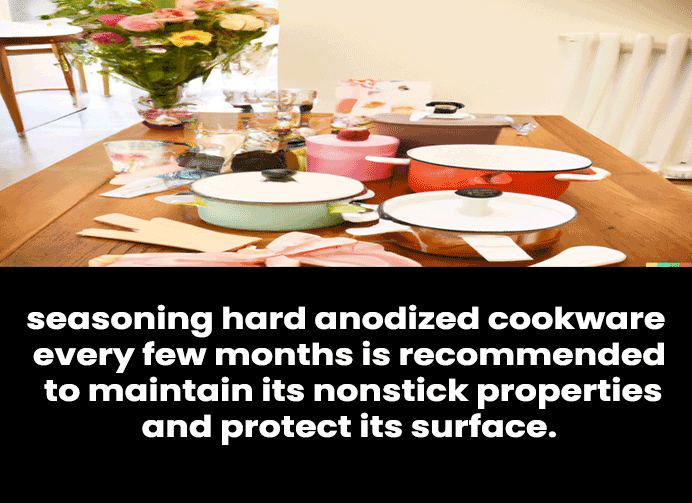Seasoning Hard Anodized Cookware: Weighing The Pros And Cons To Cook Better!
Do you want to avoid your food sticking to the pan or losing its flavor?
Look no further than seasoning your hard anodized cookware! While this may sound daunting, the benefits are worth considering. Seasoning your cookware can enhance its nonstick properties, prolong its lifespan, and even add flavor to your meals. However, there are also some potential drawbacks to consider.
In this article, we’ll weigh the pros and cons of seasoning hard anodized cookware and provide a guide to help you cook better with all the benefits of seasoning!
Hard Anodized Cookware And Its Benefits

Hard anodized cookware has been treated with an electrochemical process to harden the surface of the aluminum, making it more durable and resistant to scratches and corrosion. This process also makes the surface non-reactive, meaning it won’t interact with acidic or alkaline ingredients and alter the taste of your food.
- One of the main benefits of hard anodized cookware is its ability to distribute heat evenly, resulting in consistent cooking and fewer hot spots. It makes it a popular choice among professional chefs and home cooks alike.
- The nonstick surface makes for easy food release and hassle-free cleanup without excessive oil or butter.
- Hard anodized cookware is also oven safe, making it versatile for various cooking methods.
- Its durable, scratch-resistant surface ensures it can withstand daily use and retain its quality for years.
Hard anodized cookware offers a reliable and efficient cooking experience with many benefits, making it a worthwhile investment.
What is Seasoning?
Seasoning involves the act of enhancing the flavor of food. Seasoning is an essential part of cooking because it can help enhance the food’s natural flavors and make it taste more delicious.
Seasoning is crucial in making food taste significant and essential to the culinary arts. Hard anodized cookware is designed to be durable and long-lasting, but proper care is necessary to avoid becoming scratched or damaged. Seasoning can help to protect the surface of the cookware and prevent damage from occurring.
On the other hand, there are some potential downsides to seasoning hard anodized cookware. By seasoning your cookware correctly, you can help ensure that it lasts for many years and provides delicious and healthy meals.
Knowing the pros and cons of seasoning hard anodized cookware is essential for several reasons. Here we have enlisted some advantages and drawbacks of seasoning your hard anodized cookware.
Pros Of Seasoning Hard Anodized Cookware
There are several pros to seasoning hard anodized cookware, including:
1. Improved Nonstick Performance:
Seasoning creates a naturally nonstick surface on the cookware, making it easier to cook and clean. It can help prevent food from sticking to the surface and potentially burning, making cleaning up afterward much more effortless.
2. Enhanced Flavor And Aroma Of Cooked Food:
When you season your cookware with oil, it can help to enhance the flavor of your food by infusing it with the flavors of the oil and the spices used in the seasoning process.
3. Improved Durability And Resistance To Scratches And Stains:
Hard anodized cookware is already designed to be durable and long-lasting, but seasoning can help further protect the cookware’s surface from damage and extend its lifespan.
4. Reduction In The Need For Excessive Oil Or Fat:
Seasoning is a relatively inexpensive way to care for your cookware, as it only requires a small amount of oil and some basic kitchen supplies.
5. Easier Cleaning And Maintenance:
Seasoning hard anodized cookware creates a nonstick surface that helps prevent food from sticking to the surface. It makes cleaning and maintaining the cookware much easier, as you don’t have to spend as much time scrubbing away burnt-on food or dealing with stubborn stains.
Seasoning hard anodized cookware can provide several benefits and is a worthwhile practice for anyone who wants to get the most out of their cookware.
What Are The Cons Of Seasoning Hard Anodized Cookware?
There are a few potential cons to seasoning hard anodized cookware, including:
1. It may affect The Warranty Of The Cookware:
If you don’t season the cookware correctly, it may cause the surface of the cookware to become uneven or damaged. It can affect the cookware’s performance and potentially reduce its lifespan, ultimately hitting its warranty.
2. Time-Consuming:
Seasoning can be time-consuming, requiring several rounds of oiling, heating, and cooling. It can be inconvenient for people who prefer to use their cookware right away or who need more time to spend on maintenance.
3. Not Always Necessary:
While seasoning can benefit many types of cookware, it may only sometimes be necessary for hard anodized cookware. Some people may find that the nonstick surface of the cookware is already sufficient for their needs, or they may prefer to use other types of nonstick coatings instead.
4. Risk Of Using The Wrong Method That Leads To Food Sticking To The Cookware:
Using the wrong type of oil for seasoning can cause the cookware’s surface to become damaged or deteriorate over time. It’s essential to use an oil with a high smoke point, such as vegetable or canola oil, to ensure the best results.
5. Potential For Smoking And Odor During The Seasoning Process:
During the seasoning process of hard anodized cookware, there is a potential for smoke and odor to be produced; because the oil used in the process is heated to a high temperature, which can cause it to smoke and create an odor.
It’s essential to use an oil with a high smoke point To minimize the risk of smoke and odor and to ensure that the kitchen is well-ventilated during the seasoning process.
While there are some potential cons to seasoning hard anodized cookware, many people find that the benefits outweigh the drawbacks and choose to season their cookware to enhance its performance and extend its lifespan.
Factors To Consider When Deciding Whether To Season Hard Anodized Cookware
When deciding whether to season hard anodized cookware, several factors must be considered.
- Firstly, it’s essential to consider the condition of the cookware and whether it needs seasoning to enhance its performance or protect its surface. The cooking you plan to do, and the level of nonstick surface you require should also be considered.
- Seasoning can provide a naturally nonstick surface, which is beneficial for cooking certain foods. However, it may only be necessary for some types of cooking.
- Other factors to consider are the time and effort required for seasoning and any potential risks or drawbacks, such as uneven seasoning or damage to the cookware. Choosing to season hard anodized cookware should be based on your needs and preferences.
Types Of Foods That Benefit From Seasoned Cookware?

Seasoned cookware can benefit a variety of different types of foods, but certain types of foods may help more than others. For example:
- Foods prone to sticking, such as eggs or pancakes, can help significantly from a nonstick surface provided by seasoned cookware.
- Similarly, foods that require high-heat cooking, such as searing meat, can benefit from the improved heat distribution and retention of well-seasoned cookware.
How Often To Season Hard Anodized Cookware?

The frequency of seasoning hard anodized cookware relies on various factors, including the frequency of use, the type of cooking performed, and the condition of the cookware. Generally, seasoning hard anodized cookware every few months is recommended to maintain its nonstick properties and protect its surface.
However, if the cookware is used frequently or subjected to high-heat cooking, it may need to be seasoned more often. It’s also important to keep an eye on the condition of the seasoning and re-season the cookware if the nonstick properties start to deteriorate or the surface becomes uneven.
Ultimately, the frequency of seasoning will depend on individual usage and maintenance needs, and it’s essential to regularly assess the condition of the cookware to determine when seasoning is necessary.
Effective Methods To Seasoning Hard Anodized Cookware
Hard anodized cookware is a popular choice for its durability and nonstick properties. However, traditional seasoning methods, such as oils or fats, may not be suitable for this type of cookware. Fortunately, there are alternative methods to seasoning hard anodized cookware that can help prolong its lifespan and maintain its performance.
1. Nonstick Cooking Spray or Oil
Using a nonstick cooking spray or oil can help create a nonstick surface on the cookware over time. Apply a thin layer of cooking spray or oil to the cookware’s surface before cooking.
2. Gentle Abrasives
Using a gentle abrasive such as baking soda or a non-scratch scrubber can help remove any stuck-on food or debris and keep the cookware’s surface smooth and even. Apply the abrasive to a damp sponge or cloth and gently scrub the cookware’s surface.
3. Ceramic Coating
Another alternative method is using a ceramic coating, providing a durable, nonstick surface without seasoning. The manufacturer typically applies ceramic coatings, which can last several years. However, ceramic coatings can be prone to chipping or peeling over time, affecting the cookware’s performance.
Ultimately, the alternative method will depend on individual preferences and needs. It’s essential to regularly assess the condition of the cookware to determine the best way to maintain its performance and extend its lifespan.
What does seasoning hard anodized cookware mean?
Seasoning hard anodized cookware applies a thin layer of oil or fat to the cookware’s surface to create a nonstick coating and protect the cookware from scratches and other damage.
What is the best way to season a hard anodized pan?
The best way to season a pan is to clean it thoroughly and then apply a thin layer of oil or fat to the pan’s surface. You can do it by rubbing a small amount of oil onto the pan using a paper towel or cloth or by heating the pan on the stove and adding a small amount of oil to the surface. Once the oil has been applied, the pan should be heated on low to medium heat for several minutes until the oil has been absorbed and the pan’s surface appears glossy. The pan can then be wiped clean with a paper towel or cloth and is ready for use. Repeat this process periodically to maintain the seasoning and prevent the pan from sticking.
What are the potential drawbacks of seasoning hard anodized cookware?
Seasoning hard anodized cookware has drawbacks, such as potential smoke and odors during the process, as well as the requirement for regular maintenance.
Can I use soap to clean my seasoned hard anodized cookware?
Yes, you can use soap to clean your seasoned hard anodized cookware. However, avoiding harsh abrasives or steel wool is essential, as these can scratch the cookware’s surface and damage the seasoning.
Is it safe to expose hard anodized cookware to high heat?
Absolutely. These pans are designed to withstand a wide range of temperatures, including those from stovetops and ovens, without warping or getting scratched, provided they are used and maintained correctly. Furthermore, hard anodized cookware has stainless steel handles that withstand high heat and won’t melt like plastic handles used in traditional aluminum pans.
Conclusion
Seasoning hard anodized cookware can have its pros and cons. The pros include creating a nonstick surface, protecting the cookware from scratches, and extending its lifespan. The cons include the potential for smoke and odors during the seasoning process and the need for regular maintenance. Ultimately, making an informed decision based on personal cooking needs and preferences is essential.
It’s also crucial to take care of hard anodized cookware by following proper cleaning and maintenance procedures, regardless of whether or not it’s seasoned. It can help to ensure that the cookware performs well and lasts for a long time. With some care and attention, hard anodized cookware can be a valuable investment for any kitchen.




